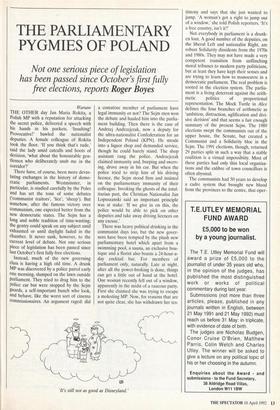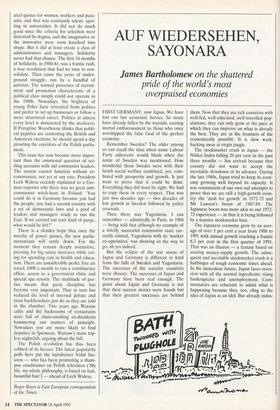THE PARLIAMENTARY PYGMIES OF POLAND
Not one serious piece of legislation has been passed since October's first fully
free elections, reports Roger Boyes Warsaw THE OTHER day Jan Maria Rokita, a Polish MP with a reputation for attacking the secret police, delivered a speech with his hands in his pockets. 'Insulting! Provocative!' bawled the nationalist deputies. A female colleague of Rokita took the floor. 'If you think that's rude,' said the lady amid catcalls and hoots of derision, `what about the honourable gen- tlemen who deliberately snub me in the corridor?'
There have, of course, been more devas- tating exchanges in the history of demo- cratic parliaments. Westminster, in particular, is studied carefully by the Poles and has set the tone of some debates ('communist traitors', lice', `sheep'). But somehow, after the famous victory over communism, one expected better from the new democratic states. The Sejm has a long and noble tradition of time-wasting; the gentry could speak on any subject until exhausted or until daylight faded in the chamber. It never sank, however, to the current level of debate. Not one serious piece of legislation has been passed since last October's first fully free elections.
Instead, much of the new governing class is having a high old time. A drunk MP was discovered by a police patrol early one morning, slumped on the lawn outside parliament. They tried to drag him to the police car but were stopped by the Sejm guards, a self-important bunch who look, and behave, like the worst sort of cinema commissionaires. An argument raged: did a comatose member of parliament have legal immunity or not? The Sejm men won the debate and hauled him into the parlia- ment building. Then there is the case of Andrzej Andrzejczak, now a deputy for the ultra-nationalist Confederation for an Independent Poland (KPN). He strode into a liquor shop and demanded service, though he could barely stand. The shop assistant rang the police. Andrzejczak claimed immunity and, burping and swerv- ing, drove away in his car. But when the police tried to strip him of his driving licence, the Sejm stood firm and insisted on the parliamentary immunity of their colleague. Invoking the ghosts of the total- itarian past, the Christian Nationalist Jan Lopuszanski said an important principle was at stake: 'If we give in on this, the police would be able to pick on other deputies and take away driving licences on any excuse.'
There was heavy political drinking in the communist days too, but the new gover- nors have been tempted by the plush new parliamentary hotel which apart from a swimming pool, a sauna, an exclusive bou- tique and a florist also boasts a 24-hour-a- day cocktail bar. For members of parliament only, naturally. Late at night, after all the power-braking is done, things can get a little out of hand at the hotel. One woman recently fell out of a window, apparently in the midst of a raucous party. First she claimed she was trying to escape a molesting MP. Now, for reasons that are not quite clear, she has withdrawn her tes- 'It's still not as good as Disneyland.' timony and says that she just wanted to jump. 'A woman's got a right to jump out of a window,' she told Polish reporters. 'It's a free country, isn't it?'
Not everybody in parliament is a drunk- en lout. A good number of the deputies, on the liberal Left and nationalist Right, are robust Solidarity dissidents from the 1970s and 1980s. They may not have made a very competent transition from unflinching moral tribunes to modern party politicians, but at least they have kept their senses and are trying to learn how to manoeuvre in a democratic parliament. The real problem is rooted in the election system. The parlia- ment is a living deterrent against the arith-
metic politics of proportional representation. The Mock Turtle in Alice defines the four branches of arithmetic as 'ambition, distraction, uglification and divi- sive derision' and that seems a fair enough summary of the present Sejm. The 1989 elections swept the communists out of the upper house, the Senate, but created a Communist and a Solidarity bloc in the Sejm. The 1991 elections, though, returned 29 parties split in such a way that a stable coalition is a virtual impossibiity. Most of these parties had only thin local organisa- tions and the calibre of town councillors is often abysmal.
The communists had 50 years to develop a cadre system that brought new blood from the provinces to the centre, that oper- ated quotas for women, workers and peas- ants, and that was constantly talent- spot- ting in universities. It did not do much good since the criteria for selection were distorted by dogma, and the imaginative or the innovative were soon knocked into shape. But it did at least create a class of administrators and managers. Solidarity never had that chance. The first 16 months of Solidarity, in 1980-81, was a frantic rush, a true revolution that had no time to con- solidate. Then came the years of under- ground struggle, run by a handful of activists. The normal processes of recruit- ment and promotion characteristic of a political class simply could not operate in the 1980s. Nowadays, the brightest of young Poles have retreated from politics and prefer to set up businesses or follow a more structured career. Politics at almost every level is dominated by the mediocre. If Peregrine Worsthorne thinks that politi- cal pygmies are contesting the British and American elections, he should spend a day prowling the corridors of the Polish parlia- ment.
This issue has now become more impor- tant than the emotional question of set- tling accounts with old communist leaders. The system cannot function without ex- communists, not yet at any rate. President Lech Walesa recently explained to a Ger- man reporter why there was no great anti- communist witch-hunt in Poland: 'You could do it in Germany because you had the people, you had a second country with a set of democratic laws and a pool of leaders and managers ready to run the East. If we carried out your kind of purge, what would he left?'
There is a slender hope that once the novelty of power passes, the new parlia- mentarians will settle down. For the moment they remain deeply insensitive, pressing for big salary increases while vot- ing for spending cuts in health and educa- tion. There are considerable perks: free air travel, £400 a month to run a constituency office, access to a government clinic and special spa resorts. The multitude of par- ties means that party discipline has become very important. That in turn has reduced the level of internal debate and most backbenchers just do as they are told in the chamber. Two years ago Warsaw cafés and the backrooms of restaurants were full of chain-smoking ex-dissidents hammering out matters of principle. Nowadays you are more likely to find deputies in Spartacus, Warsaw's main top- less nightclub, arguing about the bill.
The Polish revolution has thus been robbed of its heroes. The latest popularity polls here put the hairdresser Vidal Sas- soon — who has been promoting a sham- poo conditioner on Polish television (`My life, my whole philosophy, is based on hair, beautiful hair') — ahead of Lech Walesa.
Roger Boyes is East European correspondent of the Times.



















































 Previous page
Previous page